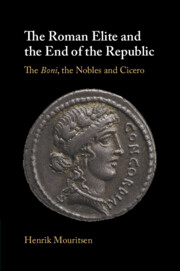Book contents
- The Roman Elite and the End of the Republic
- The Roman Elite and the End of the Republic
- Copyright page
- Contents
- Acknowledgements
- Introduction
- Part I The Boni in the Late Republic
- Chapter 1 Lost in Translation
- Chapter 2 Boni et Locupletes
- Chapter 3 Who Were the Boni?
- Chapter 4 Boni and Equites in the Late Republic
- Chapter 5 The Boni in Roman Politics and Public Life
- Part II Property and Politics
- Part III The Boni and the End of the Republic
- Appendices
- Bibliography
- Index
Chapter 5 - The Boni in Roman Politics and Public Life
from Part I - The Boni in the Late Republic
Published online by Cambridge University Press: 15 December 2022
- The Roman Elite and the End of the Republic
- The Roman Elite and the End of the Republic
- Copyright page
- Contents
- Acknowledgements
- Introduction
- Part I The Boni in the Late Republic
- Chapter 1 Lost in Translation
- Chapter 2 Boni et Locupletes
- Chapter 3 Who Were the Boni?
- Chapter 4 Boni and Equites in the Late Republic
- Chapter 5 The Boni in Roman Politics and Public Life
- Part II Property and Politics
- Part III The Boni and the End of the Republic
- Appendices
- Bibliography
- Index
Summary
The boni emerge from the ancient record as a central constituency of the Roman republic, whose importance was reflected in public discourse as well as in private communications between members of the elite. Almost all our sources mention the boni while many texts address them directly. The overall impression is that the boni – in the wider or narrower sense – in many respects constituted a ‘public’, whose views mattered to all who were involved in politics. If, as argued above, they represented a substantial, socially and economically important section of Roman society, they would naturally have maintained a presence at the centre of power. Most likely they dominated the spaces where public affairs took place, above all in and around the Forum, which many would have visited on a daily basis along with senators and equites. While in the Forum they would often have joined the crowds that listened to contiones and formed the coronae which surrounded public court proceedings. They probably also provided most of the participants in the legislative comitia that were held in the Forum; as property owners many of them would have been inscribed in rural tribes and hence able to provide an even spread of tribules that could meet the quorum requirements.
- Type
- Chapter
- Information
- The Roman Elite and the End of the RepublicThe <i>Boni</i>, the Nobles and Cicero, pp. 69 - 84Publisher: Cambridge University PressPrint publication year: 2022

